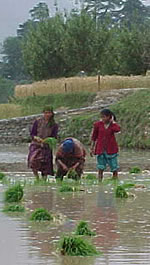by D.S. Thakur
Professor of Agricultural Economics
Regional Research Station, Bajaura

 It
is clear from the above section that technology and the Integrated
Intensive Holistic Farming Systems (IIHFS) exist to increase agricultural
production and income manifold and thus the 'Second Green Revolution'
is already in sight where these have been implemented. Therefore,
the urgent need is to transfer hi-tech agriculture knowledge and
technology to farmers to extend the 'Second Green Revolution'
to all farmers.
It
is clear from the above section that technology and the Integrated
Intensive Holistic Farming Systems (IIHFS) exist to increase agricultural
production and income manifold and thus the 'Second Green Revolution'
is already in sight where these have been implemented. Therefore,
the urgent need is to transfer hi-tech agriculture knowledge and
technology to farmers to extend the 'Second Green Revolution'
to all farmers.
The foodgrain crops yields of progressive farmers ranging from
30 to 40 quintals under rainfed and 40 to 50 quintals under irrigated
conditions in Himachal Pradesh, as compared to the average yield
of wheat of 24.30 quintals in India and 35.20 quintals in Punjab,
are still not high and up to the potential level, keeping in view,
for example, wheat yield of 87.71 quintals per ha in the Netherlands
and our own all-India National Demonstration highest yields of
63, 63.5 and 75.12 quintals per hectare of wheat, maize and paddy
respectively. Moreover, if progressive farmers of the hill state
of Himachal Pradesh can get high yields of crops, the farmers
of Punjab and all-India can do much better to usher in the 'Second
Green Revolution' in India
The major issue and task are the sustainability of high yields,
so urgently needed for the 'Second Green Revolution' to be followed
by 'Ever Green Revolution'. It will be pertinent to present and
briefly discuss the twelve-point strategy successfully followed
in Himachal Pradesh for sustainable hi-tech farming by the sample
progressive farmers during the last seven years for ensuring a
quantum jump in their production and income.



